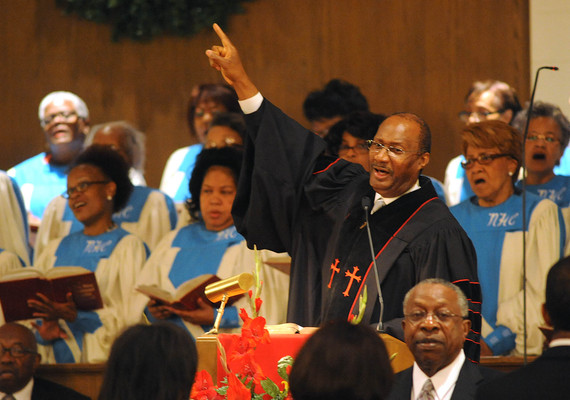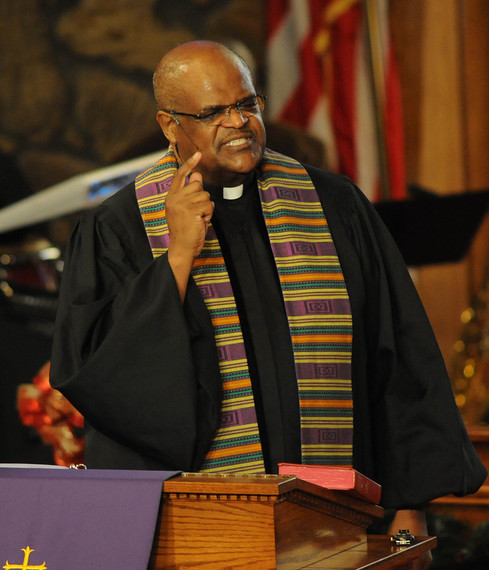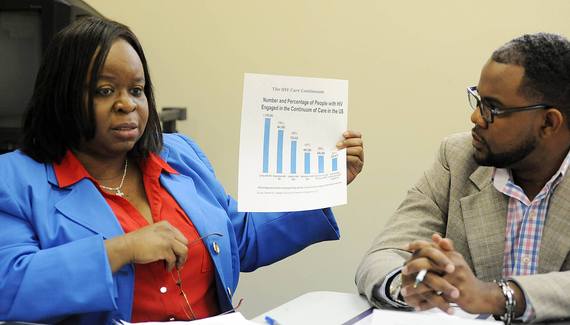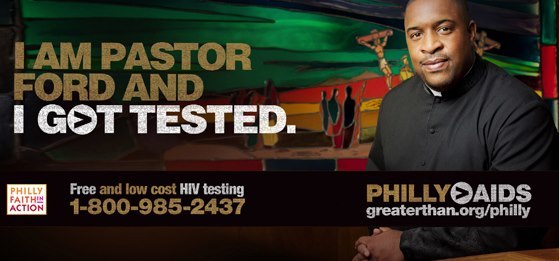By Amy Nunn, Othor Cain, Gladys Thomas, and Sharon Parker
June 27 is National HIV Testing Day, an annual public health campaign that encourages Americans to "Take the Test, Take Control." In the United States, 1.1 million people are living with HIV, and almost one in six don't know they are infected; many of those unaware of their infection may unknowingly transmit HIV to others.

Pastor Jerry Young of New Hope Baptist Church in Jackson, MS, preaches about HIV on World AIDS Day, 2013 Photo credit: Vickie King
This National HIV Testing Day, we should focus our outreach efforts where HIV infections are most heavily concentrated: in the Southeastern United States and among African Americans. Mississippi, in the heart of the Bible Belt, has alarming rates of HIV infection, and African Americans in Mississippi account for nearly 80 percent of all new HIV cases in the state. Mississippi has the highest rates of AIDS-related mortality in the country, and over half of people living with HIV in Mississippi are not in medical care. Jackson, Mississippi has the fourth highest rate of HIV infection among young African American men of any metropolitan area in the country. These alarming disparities in Mississippi and beyond are not attributed to behavioral factors alone: African Americans do not engage in higher risk behaviors than people of other races. Social and structural factors such as poverty and limited health services contribute to these disparities.
The paralyzing stigma associated with HIV/AIDS compounds these challenges. There is a still-common misperception that HIV is a "gay disease," and many people misunderstand their risks for acquiring HIV. Addressing stigma requires more than just getting medical services to people who need them; it requires community mobilization to normalize HIV testing and treatment in the African American community.

Pastor Joe May of Anderson United Methodist Church in Jackson, MS, preaches about HIV and safe sex on World AIDS Day, 2013 Photo credit: Vickie King
African American clergy must be engaged in any effort to fight the epidemic in the Deep South. African American clergy have played critical roles in the African American community for hundreds of years, including during the Civil Rights movement. However, there has been tremendous skepticism in public health circles about engaging African American clergy in the fight against AIDS. Many critics cite clergy's homophobia and churches' historical reluctance to address human sexuality and homosexuality. Some of these challenges are real; however, a close look at the scientific evidence shows that these claims are often dramatically overstated. Indeed, our own research and programs show that black clergy are very willing to engage in HIV prevention efforts, including promoting HIV testing and treatment.
History provides important lessons about how to mobilize the community around HIV/AIDS. In the 1980s and 1990s, a social movement led by white gay men left indelible, positive impacts on the epidemic. That approach was grounded in demands for equal rights for gay Americans and paved the way for our government response, including the Ryan White Care Act, and propelled development of new AIDS drugs that revolutionized AIDS treatment and saved hundreds of thousands of lives.
Engaging African American churches successfully requires a sense of urgency akin to the efforts of the 1980s. We must harness the energy and leadership power of African American churches but acknowledge some of the real challenges associated with discussing human sexuality in faith institutions. Unfortunately, this tension surrounding human sexuality and African American church involvement has divided churches and the public health community and has impeded two decades of progress in engaging black churches in HIV prevention.
Our own research and programs point to the way forward. Rather than frame our conversations exclusively about human sexuality, we make greater inroads working with clergy by framing conversations in language about civil rights, equal access to health care, and HIV testing and treatment. This approach allows for important conversations that promote HIV testing and treatment, which have proven far more effective than behavior change in reducing HIV transmission.

Dr. Sharon Parker explains the HIV care continuum to Pastor Bobby Stapleton Photo credit: Vickie King
This approach should not be misconstrued as a way to sidestep important conversations about human sexuality; rather, our own efforts suggest that focusing on HIV testing and treatment is a highly-effective means to jump start candid conversations about HIV/AIDS with clergy. This approach almost always opens the door for more frank conversations about human sexuality with both pastors and their congregations. This approach has contributed to the success of our efforts to engage black clergy in urban inner city communities and the Deep South in HIV prevention programs.
By enlisting clergy members in candid conversations about the epidemic, we can harness the power of the pulpit to mobilize the African American community around HIV/AIDS. While working with clergy from the pulpit may be a foreign concept for some scholars and public health practitioners, politicians have worked successfully with black clergy around Get Out The Vote efforts for the last 50 years.

Philly Faith in Action HIV Testing Campaign billboards featuring Pastor Jonathan Ford of Taylor Tabernacle Church
In 2013, building on our lessons in Philadelphia, Pennsylvania, we founded Mississippi Faith in Action, a statewide coalition of over 50 African American pastors committed to addressing HIV stigma, promoting testing, and getting people into HIV treatment. Engaging clergy requires community outreach and mobilization; in our efforts to date, every pastor we have engaged has supported our HIV/AIDS testing and treatment efforts. Indeed, in the last year, dozens of clergy have promoted HIV testing and treatment from the pulpit and spoken out in our media campaigns.
We must begin by mobilizing the community one pastor, one pulpit, one church at a time. As C.J. Rhodes, former pastor of Mt. Helm Baptist Church in Jackson, Mississippi stated, "It is crucial that the church stand up and speak out about what's happening in our community. The way the black church addresses other health and social issues, we must also address HIV and AIDS."